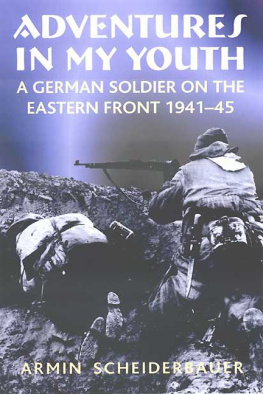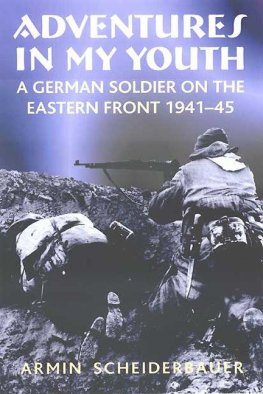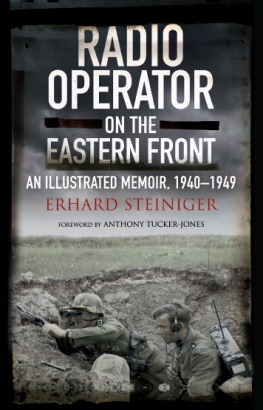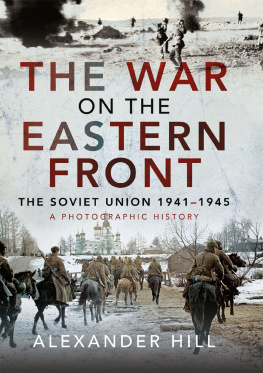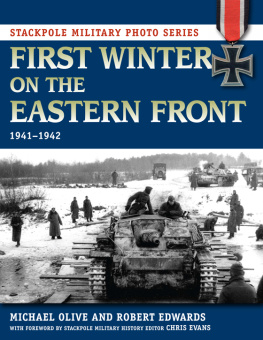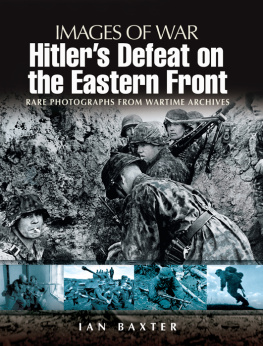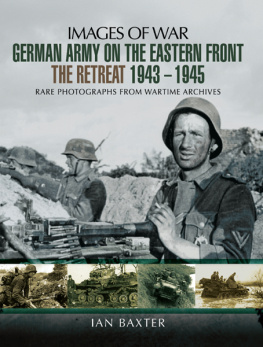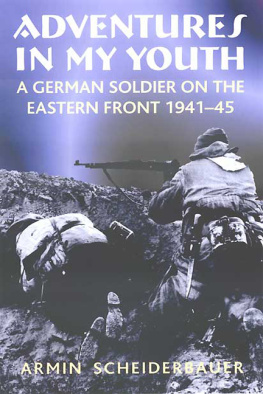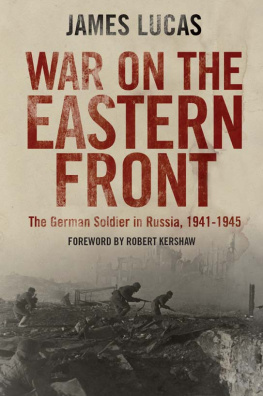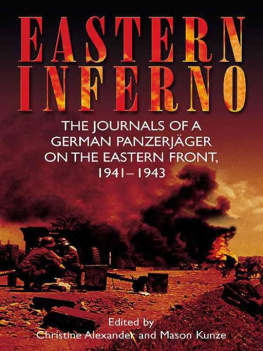
The author could be described as a veteran in every sense of the word, even though he was only aged 21 when the war ended. Armin Scheiderbauer served as an infantry officer with the 252nd Infantry Division, German Army, and saw four years of bitter combat on the Eastern Front, being wounded six times. This is an outstanding personal memoir, written with great thoughtfulness and honesty.
Scheiderbauer joined his unit at the front in 1942, and during the following years saw fierce combat in many of the largest battles on the Eastern Front. His experiences of the 1943-45 period are particularly noteworthy, including his recollections of the massive Soviet offensives of summer 1944 and January 1945. Participating in the bitter battles in West Prussia, he was captured by the Soviets and not released until 1947.
Adventures in my Youth is a unique memoir - the author originally wrote it only for his daughter.

Helion & Company Limited
26 Willow Road
Solihull
West Midlands
B91 1UE
England
Tel. 0121 705 3393
Fax 0121 711 4075
Email: info@helion.co.uk
Website: www.helion.co.uk
Published by Helion & Company Limited 2003
Paperback reprint 2010
eBook edition 2011
Designed and typeset by Helion & Company Limited, Solihull, West Midlands
Cover designed by Bookcraft Limited, Stroud, Gloucestershire
Printed by Henry Ling Ltd, Dorchester, Dorset
This English edition Helion and Company 2003
Hardcover ISBN 9781874622062
Paperback ISBN 9781906033774
Digital ISBN 9781907677496
British Library Cataloguing-in-Publication Data.
A catalogue record for this book is available from the British Library.
All rights reserved. No part of this publication may be reproduced, stored in a retrieval system, or transmitted, in any form, or by any means, electronic, mechanical, photocopying, recording or otherwise, without the express written consent of Helion & Company Limited.
Cover photograph used courtesy of Bildarchiv Preuischer Kulturbesitz.
Prologue written by Dr Sarah Williams.
For details of other military history titles published by Helion & Company contact the above address, or visit our website: www.helion.co.uk.
We always welcome receiving book proposals from prospective authors.
M
any military terms have been retained in their original German, and readers are directed to the glossary for English definitions.
The publishers wish to extend their thanks to the author, Dr Armin Scheiderbauer, for his patience and support for this book. He has dealt with all our enquiries and requests with the utmost politeness and promptitude. Dr Sarah Williams kindly agreed to write the prologue, and the publishers would like to express their gratitude for her accurate work.
To provide some background to the authors experiences, it was felt that a brief summary of the wartime activities of the 252nd Infantry Division might prove useful to readers.
Formation
The division was created on 26 August 1939, as a so-called 4th Wave division, from replacement units of Wehrkreis VIII. At that time it consisted of:
Inf.Rgts. 452, 461, 472
All divisional-level units numbered 252
Combat history
1939
Polish campaignformed part of Kampfgruppe Gienanth, seeing action at Miltitsch, Herrnstadt, Krotoschin-Lissa, Grschen, Krben, Jarotschin and Wreschen. Security work in the Konin-Klesczew area, and Posen. Transported to the Western front, October 1939.
1939-40
West/French campaignassigned to 1st Army, attacked through the Maginot Line at Geblingen, Schweix, Willerwald, the Saar canal. Further offensive operations in the Vosges, Badonviller and Celles. Transferred to Poland in July 1940, where it remained until the invasion of the U.S.S.R.
1941
Eastern Frontformed part of 4th Army, Army Group Centre, where it fought around Bialystok and in White Russia, June-September. In October it was with 4th Panzergruppe around Vyazma, and the drive on Moscow. On 11 November Inf.Rgt. 452 was disbanded, and replaced by Inf.Rgt. 7, from the 28th Inf.Div.
1942
Eastern FrontWith 4th Panzer Army until April, around Gshatsk, then with 3rd Panzer Army in the same area until the end of the year.
1943
Eastern FrontTransferred to 4th Army, with which it served at Jelnja, February to October. In November it returned to 3rd Panzer Army, around Orsha and Nevel. Grenadier Regt. 472 was temporarily inactive between 25 February 1943 and July 1944.
1944
Eastern FrontRemained with 3rd Panzer Army for much of the year, through Operation Bagration and the withdrawal to Lithuania. In July, the Division was reorganised as follows:
Gren.Regts. 7, 461, 472
All divisional-level units continued to be numbered 252
Transferred to 2nd Army in October, around the Narev bridgehead, Poland.
1945
Eastern FrontDefended the Narev area in the Soviet Vistula-Oder offensive, and subsequent retreat to West Prussia. Although much of the remnants of the Division escaped to Bornholm, they were repatriated to Kolberg, and Soviet captivity.
Bibliography
For those wishing to read more about 252nd I.D. and Grenadierregiment 7 the following are recommended:
Walter Melzer Geschichte der 252. Infanterie-Division 1939-1945 (Podzun Verlag, 1960)
Romuald Bergner Schlesische Infanterie. Grenadier-Regiment 7. Das Infanterie-Regiment 7 und seine Stamm-Truppenteile in Krieg und Frieden. Eine Chronik schlesischer Infanterie 1808-1945 (Pppinghaus, 1980)
A
rmin Scheiderbauer was born on 13 January 1924 in Grbming, eastern Styria, the eldest son of a Protestant minister. Armins parents were Austrian, and in later life Armin himself retained a sense of Styrian identity. However, in 1930 his parents moved to Thuringia, in order to gain some experience of church life in the homeland, and it was here, in Germany, that he spent the greater part of his childhood.
Armins early years were happy ones, spent in a series of small rural communities. He recalls his days in village schools and friendships with local children with considerable affection. The family was a close and happy one, and frequent visits from relatives and neighbouring ministers created a busy and lively atmosphere in the vicarage. Every aspect of daily life in the vicarage was moulded by religion. Prayers were said in the morning, evening, and at mealtimes, and from an early age Armin was actively involved in the church itself, not only attending services but acting as a bell-ringer and as an organ-pumper on Sundays. Within the family church holidays, such as Reformation Day, were important staging posts of the year. Armins confirmation and the course of preparatory lessons which preceded it marked an important rite of passage in the boys early life. In later life he looked back on the vicarage and its valuesthe emphasis on duty, positive action, and putting Christian virtues into practice in daily life - as being a lasting influence on his ideas and outlook.
Religion was not, however, the only important influence on Armins social and psychological development. From an early age he took a particular interest in history, and his ideas about Germany and its place in the world were formed in his early childhood. The events of the Great War and the injustice of its outcome were something of which Armin was aware from his earliest years at school. In particular he knew about and was proud of the medals which his own father had gained for service in that conflict. Two events at school played a particular part in developing Armins sympathy with nationalistic sentiments. The first was a visit from a participant in the sea-battle outside Skaggerak, who had survived the famous sinking of the cruiser Frauenlob . This inspired in the young Armin an ambition to join the navy, perhaps as a U-boat officer. The second was the performance of the plays Wallenstein and Egmont by Goethe, which awoke in Armin a strong admiration for military valour and an interest in the heroic ideal. These impressions were strengthened by other nationalistic influences in the environment: a series of images from German history on cigarette cards made a particular impression on his imagination, as did the books detailing subjects such as the history of Germanys lost colonies which he received as school prizes. Even as a boy Armin had developed the conviction a career in the armed forces would be the most honourable path that he could aspire to.

